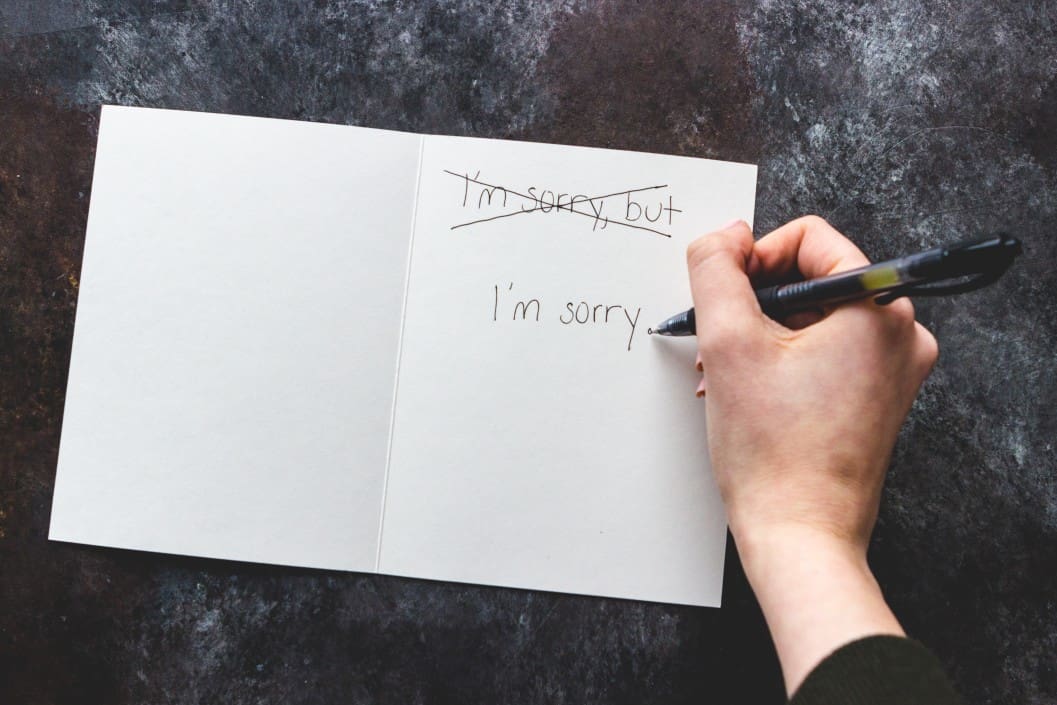
I Forced Myself to Stop Saying Sorry for 2 Weeks. Here’s What Happened.
March 29, 2019 Written by Aley Brown

Compare Providers
Download our outplacement comparison sheet
Request Pricing
Compare our rates to other providers
If you’re a business woman in 2019, you’ve probably heard about this little phenomenon I like to call the “sorry syndrome.”
What is it, you ask? Well, studies have shown that women say “sorry” in their day-to-day lives much more than their male counterparts.
This syndrome has become such a talking point in career, feminist, and even HR circles that big brands have actually started to use it in ad campaigns. (Peep the Pantene ad below.)
If you’re anything like me, you probably hear this and think: so?
Well, saying sorry all the time actually has some pretty negative effects. An article published by Psychology Today explains that when you say sorry too much, it lessens the value of a genuine apology, can make you seem inadequate, or even that your own presence in a certain situation is wrong.
It’s hard enough for women to succeed in the business world. By being complicit in the “sorry syndrome,” women are essentially making it harder on themselves.
Something that I want to point out is that nowhere in this article do I want to blame women for this problem. Society has created an environment where women feel they have to say sorry. And that is solely where the blame should be held.
Okay, anyways, after hearing all about the “sorry syndrome’ for the last four years, I wanted to test how it actually impacted my life. To do this, I set out on a two-week experiment.
Here were the parameters:
- Day 1: Research why women say sorry so much.
- Day 2-3: Mindfully keep track of the number of times a day I say “I’m Sorry,” and compare it with a male coworker.
- Day 4: Crowdsource different ideas about how to stop saying it.
- Day 5- 14: Actively try to keep myself from saying I’m sorry.
Day 1: Research? What, Like It’s Hard?
I’m a research and data fiend, so I was really looking forward to this day. Here is me right now:
I read a ton of different studies, but the most compelling one to me explained the reason why women actually say sorry more than men.
The truth is, according to the researchers, that women find their own behavior more offensive than men do, which leads us to apologize more. This is really the root of the problem: it isn’t that I’m saying sorry too much, but that I think my actions are inappropriate and, therefore, I should apologize for them.
In my opinion, feeding into this cycle of feeling like your behavior is always offensive, can make women come off as meek and unsure of themselves when expressing a viewpoint, which can can hinder job performance and a bunch of other things.
So, from this research, I had to set a goal for myself to not only stop saying sorry so much, but also to rewire my brain so that I won’t think my own behaviors are offensive.
Day 2-3: Work BFFs Put It to the Test
Enter Josh. My brother from another mother.
But for real, we are the 2 full-time marketing employees here at Careerminds, and we spend A LOT of time together and don’t hate each other. (Well, maybe just a little. I kid,I kid.)
I devised a plan that Josh so graciously went along with where we would keep track of how many times a day we both said “I’m sorry.” Then we’d compare what we each tallied up.
I should note that during this two-day period I had a cold, and was apologizing more than usual for coughing on the conference line. So my results might be a tad bit skewed higher.
But, the results were still telling.
On average, I said “I’m Sorry” nine times a day, and Josh only said it twice.
This means that in a year’s time I apologize 2,500 more times than Josh. Whoa.
When I heard that, it absolutely floored me! Josh and I are really similar in our work ethic and the people we talk to everyday, so I knew I couldn’t have been screwing up more than 4 times as much him.
I wanted to dig in deeper, so I asked Josh for the reasons why he had said sorry. For him, he said it when he genuinely felt bad and had remorse, for example: when he didn’t make it to the baptism of his friend’s child.
“For the most part, I only apologize when I’m truly sorry or believe to be in the wrong,” Josh told me. “I don’t think I say it out of habit or as a reflex.”
I looked at my own list: when I coughed on a call, was two minutes late to a meeting, when I had feedback for someone on the marketing team, when my dog got under my feet (I legitimately apologized to a dog….).
It seemed like I was apologizing whenever any of my behavior wasn’t perfect, or when I perceived my own behavior as being annoying or disruptive to someone else.
Which sucked. I am a human, I’m allowed to cough, be 2 minutes late every once and awhile, and give feedback to the marketing team that I manage. These might be “annoying” to some people, but in general, they are just me being a human. And I shouldn’t have to apologize for that.
Day 4: I Get By With a Little Help From My Friends.
So at this point, I was pretty overwhelmed with my findings. I consider myself a very aware person when it comes to gender issues, so I thought that I would have better results than I actually did when comparing myself to Josh.
I decided to reach out to my network for advice and feedback about how they manage their own issues with the sorry syndrome.
When I posted about it on LinkedIn, I had no idea that I would receive so many comments and even private messages from people offering their opinions or advice.
The thing that stuck out to me the most from these comments were that tons of people – both males and females- believed that saying sorry can be a valuable tool for creating authentic relationships when you have actually done something to be sorry for. This was really what I needed to hear at this exact moment, because after my experiment with Josh I was ready to never say sorry to anyone ever again.
But that wouldn’t have been the right solution to my problem. I’m a caring and empathetic person, and I truly believe that is one of my super powers in business. It allows me to build strong relationships with my coworkers and other people in my network, which then allows us to achieve our goals together in a more efficient way. And completely removing sorry from my vocabulary really goes against that super power.
It was also helpful to hear from other women on LinkedIn that struggle with the same issues. The best tip I received was from an old friend, Annie Cutler, who suggested that I use a gmail plugin called “Just Not Sorry.” This plugin underlines any apologetic or de-qualifying language you write in emails (just, sorry, I feel, I think, etc) so that you can edit it (if you choose to) before sending.
Another piece of advice that I received, and that I loved, was to say “thank you” instead of sorry. I thought this really matched with my personality of being caring and empathetic, and allowed me to note when people were more patient with me. So instead of saying “sorry I’m a few minutes late,” I would say “I know I’m a couple minutes late, thank you so much for being patient.”
So with all of this great advice in mind, I decided to set out on the final stretch of this 2-week trek. I wanted to change the way my mind was wired so that I stopped thinking my behavior was offensive, and thus stop apologizing as much. But I knew that I didn’t want to radically change my personality, so I wanted to be mindful of allowing myself to apologize when it was called for.
Little did I know, the next 10 days were going to be some of the hardest in my career….
Day 5- 14: Put Your Money Where Your Mouth Is
So, I started out on this 10 day stretch with a lot of confidence. I was aware of my sorry syndrome, I had some great advice, and I was motivated to fix it.
And then BAM.
On my first day, at 9:24 AM, I said “sorry” for not getting a document to someone immediately when they asked for it.
Why must I make my own life so difficult?!
It honestly just came out of my mouth out of habit. I really wasn’t even thinking that I had made a huge mistake or that I had done something wrong. My brain was just programmed to think: “Oh, I did something that wasn’t perfect in someone else’s eyes, better say sorry.”
This was the first incidence where I knew the next 10 day were going to be super challenging.
Throughout the rest of the day, I managed to avoid saying it. I caught myself two times almost apologizing, and then was able to hold it back. But it literally felt like I was swallowing a brick.
The next day, I had what I considered my first really successful sorry scenario. I work from home, thus my dog, Phog, is around me 24/7.
Well, sometimes Phog eats way to much food all at once and then gets really sick. And sometimes, like this day in particular, she decided to start vomiting right when I have a meeting.
I wasn’t going to just let Phog vomit all over the house while I took a call, so I made a decision to take her outside, let her get it together, and then clean up the mess inside the house. I felt like this took hours because of the panic I felt of not making it to a meeting, but in reality I was only 10 minutes late. And the meeting was with the marketing team that I manage, so I knew they would be really understanding.
When I finally logged in to our meeting, I was ready. I knew in my brain that I wasn’t going to say sorry, but that I was going to tell everyone on the call thank you for being patient. I did just that, and held my breath waiting for a mutiny.
But to my surprise, no one reacted badly. Everyone was really chill about it and understood needing to take care of my dog.
**Me breathing sighs of relief**
From that point on, I found not saying sorry got easier, but it still wasn’t “easy” per se.
My job can be really busy and strenuous, and having to think double time about changing my behavior was super exhausting. I drank way more wine after work and noticed myself going to bed earlier because I was mentally exhausted. The mental labor it takes to be a strong business woman when society has molded you to exhibit different behaviors can be really exhausting.
But I found it got easier everyday that I kept trying. From this point on, I didn’t slip up at all. However, there were a few relevant incidents that I want to point out.
Going into my one-on-one with my CEO, I was really nervous about saying sorry because I was catching myself doing it more around authority figures. During our call he asked about our lead pipeline, which was something that I wasn’t prepared to talk about it. I had no number to show or discuss with him.
I immediately wanted to say “I’m Sorry,” but I caught myself, explaining instead why I didn’t have anything prepared to discuss at this moment.
“Since our outside agency is currently working on our reporting dashboard, it isn’t easy for me to pull up data and immediately show you our progress, but if this is something you want in the future at all of our one-on-ones, I would be happy to prepare it.”
He immediately understood and said that sounded good for him. I told him thank you for understanding and that I looked forward to reviewing it with him in our next call.
I know this conversation sounds super easy, but for me, this was a huge step! The person in my company that I am the most nervous around, and most likely to apologize profusely to, reacted positively to my “thank you strategy.”
I felt like a million bucks!
The last incident I want to point out involves me actually apologizing, but when I thought it was warranted. This might not sound like a win, but it was for me, because I strategically said I was sorry when I felt like the situation actually warranted it.
My best friend’s boyfriend, Todd, has his own plumbing business close to where I live in Kansas City. He is trying to figure out how to take it to the next level, and asked me to help talk him through all the different marketing tools and let him know what I think of his website and overall marketing strategy.
We were texting back and forth, and he asked on Wednesday night if I could drive to his town that weekend to work on it with him. My cold turned into a full on flu that day, and I didn’t respond to anyone’s text or even work by the end of the week.
The asthmatic that I am was just trying to focus on breathing, so texting him back and setting a plan completely slipped my mind.
When I finally started feeling better the next week, I realized that I had unintentionally blown him off, and I felt horrible about it. I immediately reached out to him, apologized, and explained what had happened.
For some people this might not have seemed like a situation that warranted an apology, but for me it felt genuine and I knew that I had made a legitimate mistake. And I think mindfully apologizing like this was a big win for me.
Final Thoughts
These two weeks were a whirlwind, but it was so valuable to my career. As I write this article a few weeks later, I am still mindfully choosing when to say I’m sorry and I feel great about it. Also, I feel like I’ve successfully rewired my brain to not think of my behaviors as offensive, but rather to think that the person who I would apologize to having behavior of being understanding – which I can in turn express gratitude towards.
I notice that I am more confident, which translates into me being better at my job (I work in marketing and sales, where confidence is really important).
Some unintended consequences of this experiment is now my hyper awareness of everyone’s “sorry syndrome” behaviors. I pick up on if people say it way more than they should, and if it invalidates their stance in a conversation. Because of this, I’m now focusing on ways that I can approach these people and give them advice on how to modify their own behaviors.
I also asked some of the people closest to me if they noticed a change in my behavior.
My sister and boyfriend, who both live with me, told me that they noticed I seemed more confident and happy, but that I was also more tired. (Duh, I could already tell you that!)
This is what Josh said:
“I think the most shocking thing for me was at the beginning when we were comparing our ‘sorry rates’ to each others. There was a large gap between how many times I said and how many times you did, which was definitely interesting, but I didn’t notice you not saying it to me or that you said it so much to begin with.”
When I read that, I thought: was there even a point in doing this whole experiment if people don’t pick up on how it has changed my behavior at work? But then I realized it doesn’t really matter.
This experiment has made me feel more confident. And while people might not pick up on the change in my verbiage, they will pick up on the confident energy I put out there, and in the end that is what really matters.
In need of outplacement assistance?
At Careerminds, we care about people first. That’s why we offer personalized talent management solutions for every level at lower costs, globally.



